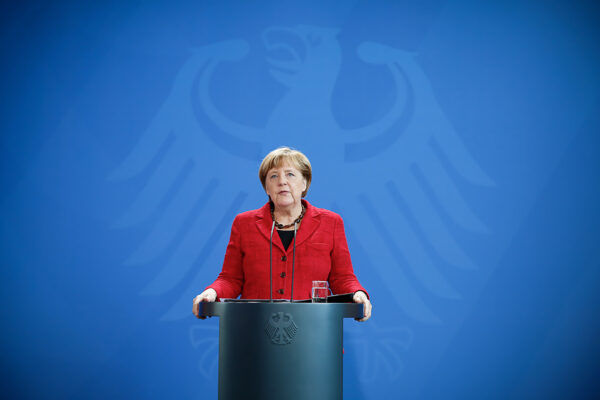
“The people in Germany have never had it so good,” Angela Merkel said on Wednesday — and she exhorted them to stay the course that has brought them this far.
In a speech to parliament that was seen as heralding her campaign to seek a fourth term as chancellor next year, the German leader called for unity on “multilateralism” and “shaping globalization together with others.”
“Openness will bring us more security than isolation,” she said.
That’s quite a reversal for the Christian Democrat, who only a few years ago said Multikulti had failed.
Triangulation
If Merkel intends to fight next year’s election on the very open-versus-closed terms that shaped the Brexit referendum in the United Kingdom and the recent presidential election in the United States, it would confirm Alex Harrowell’s thesis in Politico earlier this year that her strategy is one of triangulation: finding compromise between opposing poles in order to create a new, diagonal, crosscutting line between new poles.
This is how we should see her immigration policy, he argued:
Merkel defines a new division, between globalists, or at least Europeans, and nationalists or — thinking about extreme-right protest group PEGIDA’s profoundly local base — regionalists.
She thus pits centrists in her own party, the Social Democratic mainstream, the Greens and the Free Democrats against the Alternative für Deutschland, Die Linke and the reactionary elements in the Christian Democratic alliance, especially her Bavarian sister party, the Christian Social Union.
If the Alternative winning a few seats in state legislatures highlights this divide, it only serves Merkel’s purpose.
Germany’s Greens — far less radical than in other countries — are likely to hold the balance of power in the next parliament, which is why Merkel must court them.
The Greens are both “an absolutely viable coalition partner and an absolutely viable competitor for naturally centrist-conservative voters,” according to Harrowell.
Balancing act
The risk is that, in pursuit of such voters, Merkel will make the same mistake as Democrats in the United States and inadvertently push well-meaning conservatives over the edge.
Hillary Clinton’s campaign assumed that up-and-coming demographics with fairly liberal sensibilities — Hispanics, working women, young voters — would put her over the top.
But by emphasizing the issues that mattered to them, her campaign lost sight of a traditional Democratic voting bloc: the mostly white working class in the industrial Midwest. For the first time in decades, they voted for a Republican this year.
There are signs something similar could happen in Germany. Merkel’s conservative parties are at around 33 percent support in the polls — far ahead of everyone else, but down from 41.5 percent in the last election. The Alternative is at 13 percent and the liberal Free Democrats are again polling over the 5-percent election threshold. If both parties made it into the Bundestag, Merkel’s plurality would be significantly reduced.
Every campaign is a balancing act. Merkel must take care to protect her right flank before she sets off to chase voters in the center.
